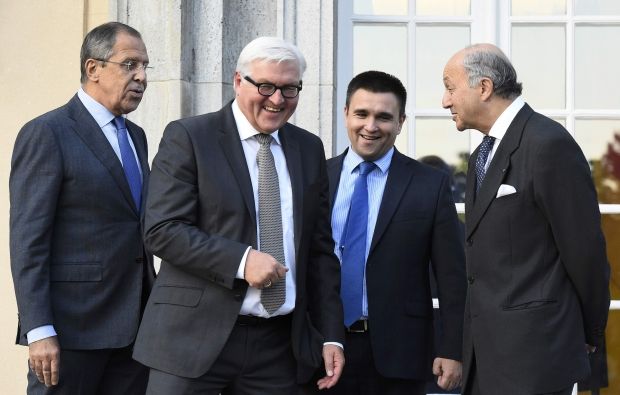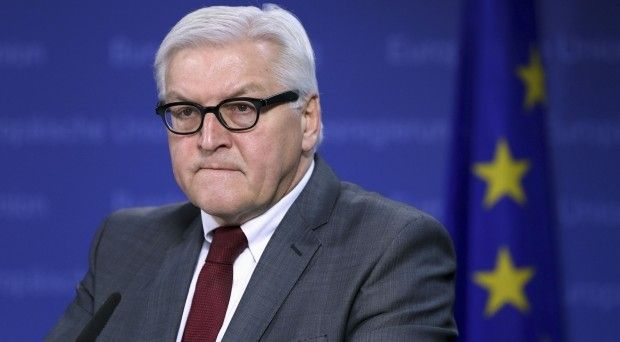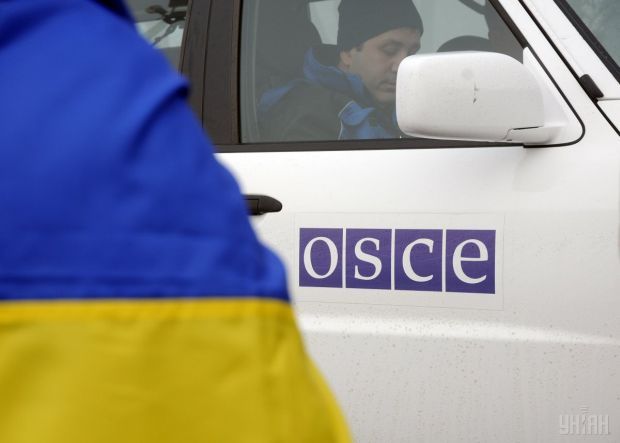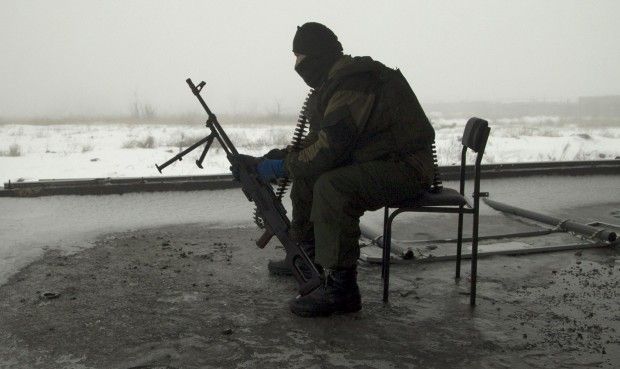
Anxiety in Paris
Foreign Ministers of Ukraine, Germany, France, and Russia are meeting in Paris on March 3. Considering the recent rhetoric of all the negotiating sides, Ukraine should not expect anything good from these talks.
On March 3, Paris will host a meeting of the Normandy Four foreign ministers, where the top diplomats from Ukraine, Germany, France, and Russia will once again try to give a new impetus to the implementation of the Minsk agreements. After the last such meeting at a Munich Security Conference, Foreign Minister of Ukraine Pavlo Klimkin said that it was in fact just a preparation for the full-fledged negotiations, and therefore it did not see any concrete outcome. In addition, it was branded as “preparatory” because of the absence of the Minister of Foreign Affairs of France (Laurent Fabius had resigned at the time).
Pavlo Klimkin has later told the press, what the diplomats were planning to discuss in Paris on March 3: "In the past, our colleagues believed that security means stopping the shelling. Now there is a clear understanding that this is also about providing OSCE SMM access to all the areas of Donbas. Then - and this is crucial – there must be access to the SMM to the border and its actual monitoring. This monitoring should mean the following: the creation of special SMM bases along the border; the opportunity, in the first stage, to carry out unannounced inspections, at the second stage - put their people at all of these nine bases to control them, and at the third stage - creating an effective system of control over the sections between these bases. The fourth element of security is who will monitor the withdrawal of weapons and, if some part of them will be put under control, who will monitor its storage. We need the international component for this. Now, the main idea of the international component is an international mission of the OSCE," Klimkin said.
In turn, President of Ukraine Petro Poroshenko had voiced his proposals for discussion in Paris back in 2015. According to him, Ukraine in the Normandy format and at the meetings of the trilateral contact group will demand binding of all Russian obligations under the Minsk agreements to specific dates in 2016. And Ukraine will insist on this. "Minsk process today means clear commitments providing for a political solution to the conflict, gaining and returning control over the uncontrolled parts of the Ukrainian-Russian border, the withdrawal of all occupation forces and illegal armed units from the occupied territories of Ukraine and the restoration of Ukrainian sovereignty over the occupied territories," he said.
Insurmountable obstacles
Traditionally, Europeans have their own vision of the Minsk process. During a recent Kyiv visit of German Foreign Minister Frank-Walter Steinmeier he said that the Paris Normandy Four meeting at the level of foreign ministers in Paris on March 3 will be a key one, and certain success will be recorded.

He said that while there is no reason to be pleased with the current progress in the implementation of the Minsk agreements, on the other hand, he sees no other alternative to this process.
The diplomat noted that the parties would reach certain compromise and agree on a common position, to overcome all the obstacles that still divide them.
One of these obstacles is the topic of the elections in the occupied Donbas. German Foreign Minister insists they be held in the first half of this year. This was also confirmed by the Permanent Representative of France to the UN, Francois Delattre, according to whom, in addition to issues of ceasefire, other provisions of the Minsk agreements will also be considered in Paris: the constitutional reform, decentralization and a special electoral law for Donbas. In addition, the diplomat said that the objective of the Paris meeting in the future is the return of Ukraine to its internationally recognized borders, which means regaining control over Crimea.
However, Steinmeier said that despite some de-escalation of the conflict and reduced number of ceasefire violations and victims, the sides were "still far away from political solution."
The road map
Political expert and director of the Center for Civil Society Studies Vitaly Kulik believes that the meeting in Paris will have the political block of the Minsk deal as a major issue. The second point will be the restoration of infrastructure and the creation of a specific trust fund, which could be directed to infrastructure projects (this is required in case the elections are held in Donbas). But all of this is within the framework of provision of truce and the restart of the negotiation process.
"However, the parties have not shown readiness to mutual understanding, especially Russia," which "is preparing to escalate the conflict and will try to influence Kyiv psychologically," according to the expert.
At the same time, Kulik admitted that some kind of a "road map" can be signed in Paris, a specific timetable for the implementation of the Minsk agreements. A contact group, which deals with the tactical issues of the Minsk process, does have such "road map." And it has clear dates for the execution of certain steps: demining, exchange of prisoners, and so on.
At the same time, the expert doubts that the meeting will see the strategic issues agreed, relating to Ukraine regaining control over the sections of its border in Donbas or the date of elections in the occupied territories.
The imitation game
However, co-director of programs of foreign policy and international security at Razumkov Center Oleksiy Meknyk believes it is obvious that during the Paris meeting, pressure on Ukraine will be increased over the implementation of its commitments on constitutional reform and the elections in Donbas.
At the same time, according to the expert, no fundamental change in Russia's position can be expected. "I don’t see any reason for Russia to make any concessions, since even a nominal presence of foreign observers from the OSCE is not desirable for it. Therefore, any progress is unlikely. Russia may take some symbolic steps, for example, letting the OSCE to another checkpoint to control 200 meters of the border of 400 kilometers, and it will be reported as a huge victory," said Melnyk.

"According to the mandate of the OSCE SMM, it should have unhindered access to the entire territory of the occupied areas of Donbas, but, in fact, they only have access to where they are let through," said the military expert.
At the same time, it is noteworthy that Russia, if you follow the text of the Minsk agreements, has no obligations whatsoever. "The question of the implementation of the Minsk agreements by Russia is raised because everyone seems to understand who is a party to the conflict. But Russia can "play the fool" at any time, and the Russian leadership has succeeded in doing so. They would say: show us at least one provision of the Minsk agreements, where Russia has any obligations," he said.
According to Melnyk, when the Ukrainian president, as well as Western leaders, talk about Russia's fulfillment of the obligations under the Minsk agreements, "they thus don’t say everything." "It is obvious that there are some secret agreements that are not spelled out in the text," he said.
As for the progress and breakthroughs at the forthcoming meeting that Mr Steinmeier expects, in the expert’s opinion, this means that Ukraine will be forced to fulfill its obligations under the deal. In particular, it is about Kyiv agreeing to hold and recognize elections in the occupied Donbas.
However, Melnyk admits that the head of the German Foreign Office has some reasons to talk about the possibility of elections in Donbas to be held in the first half of 2016. However, the vote, if any, can only be an imitation of such under the tacit consent of Ukraine and Europe. A recognition of this imitation of elections can only be "for show," to claim that the conflict is supposedly settled.
The worst scenario
Ukrainian diplomat, former Consul General of Ukraine in Edinburgh Bohdan Yaremenko believes that Ukraine has no clear vision of how to move forward and continue to evade absolutely unprofitable and counterproductive proposals in the framework of Donbas settlement. Germany, in fact, puts pressure on Ukraine regarding the implementation of the country’s political commitments within the Minsk deal, actually trying to ignore the fact that there is war in Donbas, the shelling continues, and there is no hostage exchange. Therefore, according to the diplomat, the upcoming meeting in Paris will boil down to a weak concluding that that there is no truce at the moment, but it is still necessary to hold an election. This is the scenario that is the least appropriate for Ukraine and the most dangerous one.
"Russia is quite satisfied with the position of Germany; obviously, they have overlapping interests in the sense of lifting the sanctions and restoring economic cooperation. In this case, it is very difficult to predict what could be a positive scenario for the development of these negotiations or achievement of any agreements that would be profitable for Ukraine," he said.
According to Yaremenko, a German diplomacy today is not able to provide a clear vision of the settlement of the Russian-Ukrainian conflict. In other words, everybody understands Russia’s negative role, but without being able to articulate a clear strategy, it’s all just treading water in the framework of the Minsk deal, pushing Ukraine to the fulfillment of the political part of the agreements. And it’s all without taking into account the simple fact that there is war in Ukraine and that the initial provisions had not been implemented – the ones that were agreed upon in Minsk over a year ago.

According to the diplomat, Ukraine needs to change its approach and pursue a more active, aggressive diplomacy aimed at explaining the country’s inability to fulfill the Minsk deal, changed circumstances, and the failure of the other parties to comply with these agreements. In the end, Germany and France also fail to implement the Minsk agreement in terms of the recovery of the banking system in Donbas, said Yaremenko.
The diplomat believes that it is necessary to change the negotiating line radically and replace "the excuses” with a categorical refusal to negotiate on any other subject until the fire ceases in Donbas and Russia withdraws its weapons.
Minsk deadlock
Expert on foreign relations Oleh Bielokolos notes that the Minsk agreement is so vague and unclear that each country interprets it its own way. Russia, of course, is interested in the elections in Donbas and the legitimization of the people who are in power today in the so-called "DPR" and "LPR." "Russia will definitely use the escalation or de-escalation of the situation in its own interests. It actually orchestrates this conflict. It will be as Putin decides, and Ukraine shouldn’t expect anything good in its east in the near future," said Bielokolos.
However, it is not an option for Ukraine, and the country should seriously insist that the elections in the current conditions are hardly possible. "Everyone understands that no OSCE standards are possible there, the Ukrainian media do not and will not be able to work there, no Ukrainian political parties, except, perhaps, one or two of them, will be able to operate there. Therefore, it is obvious that recognizing the elections in such conditions, or even holding them, is unrealistic," he said.
Another problem of holding “the elections in Donbas in the first half of the year" is the issue of the internally displaced persons. According to various estimates, there is about a million of them. It is unlikely that one of the highest negotiators today knows how to ensure the voting rights of these IDPs.
The occupied Donbas lives in its own reality today, at Russia’s expense. According to experts, Ukraine is not able today to cope with a wide range of political, economic, and ideological issues. "It looks like a dead end. Everyone keeps repeating the mantra about the need to implement the Minsk agreements, but no one understands or sees how to fulfill them," Bielokolos said.
... In this situation, the most obvious scenario is a certain freezing of the Donbas conflict. In this situation, Ukraine should strengthen its prowess, implement reforms as much as possible, and fight corruption.
Kostyantyn Honcharov

